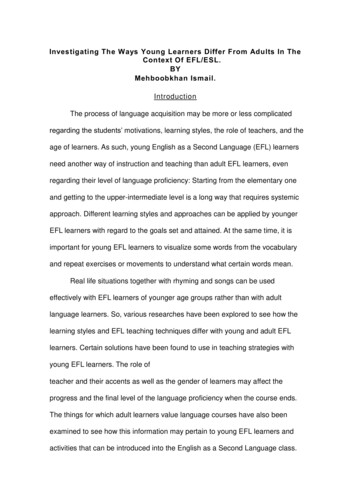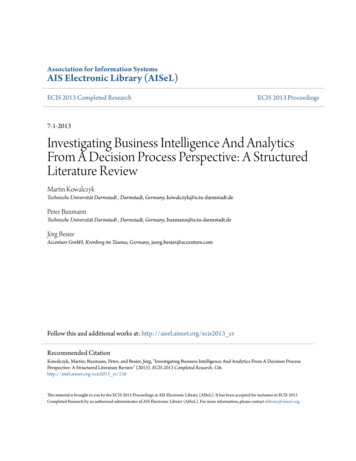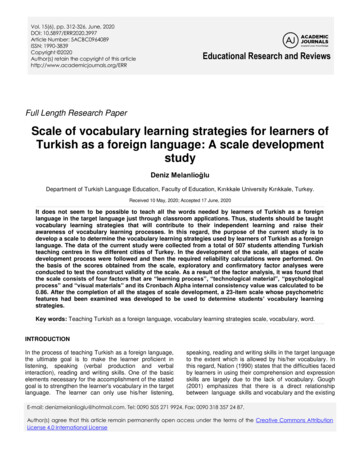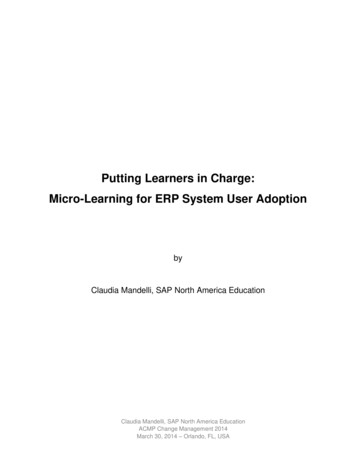
Transcription
Investigating The Ways Young Learners Differ From Adults In TheContext Of EFL/ESL.BYMehboobkhan Ismail.IntroductionThe process of language acquisition may be more or less complicatedregarding the students’ motivations, learning styles, the role of teachers, and theage of learners. As such, young English as a Second Language (EFL) learnersneed another way of instruction and teaching than adult EFL learners, evenregarding their level of language proficiency: Starting from the elementary oneand getting to the upper-intermediate level is a long way that requires systemicapproach. Different learning styles and approaches can be applied by youngerEFL learners with regard to the goals set and attained. At the same time, it isimportant for young EFL learners to visualize some words from the vocabularyand repeat exercises or movements to understand what certain words mean.Real life situations together with rhyming and songs can be usedeffectively with EFL learners of younger age groups rather than with adultlanguage learners. So, various researches have been explored to see how thelearning styles and EFL teaching techniques differ with young and adult EFLlearners. Certain solutions have been found to use in teaching strategies withyoung EFL learners. The role ofteacher and their accents as well as the gender of learners may affect theprogress and the final level of the language proficiency when the course ends.The things for which adult learners value language courses have also beenexamined to see how this information may pertain to young EFL learners andactivities that can be introduced into the English as a Second Language class.
3Review of the Li teratureTeachers should apply various techniques to make young EFL learnersinterested and focused. As suggested in the study by Stelma and Onat-Stelma(2010), teachers that specialize in the area of adult learners need some time andexperience to make their way toward children in a younger learners group. So, it isnecessary to take into account the level of a teacher’s expertise and his or herattitude to young EFL learners. The process of classroom management may betreated as the one going beyond “a metaphor of the teacher as a manager and/orfacilitator, to focus more broadly on how teachers interact with and involve learnersin ways that may result in the kinds of educational outcomes that they aim topromote” (Stelma and Onat-Stelma 2010, p. 195). So, the role of teachers shapesthe teaching-learning process.The learning styles are claimed to be one of the most studied concept relatedto language acquisition and learners’ behavior, motivations, and other theories andapproaches. As such, the learning styles of EFL learners regardless of their age candepend on a number of factors including context, environment, encouragement, andothers. Mercer (2011) reported that learners’ beliefs shape the way learners feelabout the process of language acquisition and their progress in it. In addition, thelearners’ beliefs are affected greatly by the learners’ environments, contexts, andexperiences. It is inappropriate to try to describe a learner’s beliefs as either positiveor negative, because the “learners’ belief systems [is] appropriate for a particularindividual embedded within a specific sociocultural and educational context, andeven more importantly set against the backdrop of the individual’s unique personalhistory and experiences” (p. 70-71). So, progress in language acquisition dependson many factors that are applied to different learners.
4The role teachers play in the language learners’ progress is immense. It isimportant how a learner perceived the teacher and treats his or her instructions. Thismeans that mistakes made by teachers may contribute negatively to learners’motivations, learning styles, and the overall perception of the teacher in the processof language acquisition. As reported in the study by Butler (2007), teachers that werenative English speakers and nonnative English speakers took part in the research toshow how EFL learners can change their perception of the oral speech when someportions of text are read by native or nonnative speakers of the language. Theteachers in Hong Kong believe that “NESs [native English speakers] are superior toNNESs [nonnative English speakers], particularly in oral communicative abilities, andthe teachers’ authority and confidence may be threatened by such beliefs” (Butler2007, p. 3). So, the qualification of language teachers matters a lot for the waylearners perceive the spoken speech and progress in language acquisition.Different techniques have been used by language learners to improve theprogress and achieve better results, Learners motivations and styles can beresearched as important components of a learner’s progress, whereas basicachievements in language acquisition may be as significant as the further progress.In this respect, Gorsuch and Taguchi (2010) suggested that reading proficiency maybe one of the factors that influence the way EFL learners understand the informationand memorize words and speech patterns. This means that EFL learners that have abetter reading proficiency have higher chances in attaining success in this areacontrasted to those with poor reading proficiency.Conferences are used to improve understanding of the language teachers andlearners’ problems and issues. It is also a good way for sharing findings andconcerns about the learners’ progress and factors that may compromise their
5progress, including accent of the language teacher or learning style and motivations.As reported by Fortune and Andon (2012), the article by Natsuko Shintani, focuseson young EFL learners, “aged six, recruited by a private language school inJapan” (p. 168). The author of the analyzed article researched the output and inputof learners and the social speech as the one pertaining to the better level oflanguage acquisition and a great progress. Besides, vocabulary output tasks canfacilitate and improve the EFL learners’ acquisition techniques and contributepositively to their overall perception of tasks in terms of the progress.The use of modern technologies can be beneficial for EFL learners at any ageand with any language proficiency level. Communicating with each others in socialnetworks users from different parts of the world can improve their languageproficiency independently from language teachers and EFL courses. At the sametime, EFL learners can improve their progress by means of getting involved intovarious courses aimed at facilitating interactions with other language learners.Peterson (2012) stated that the use of the 3D multi-user virtual environment referredto as Second Life can be rather effective for EFL learners, because they coulddiscuss and negotiate the meanings of phrases when certain problems occurred.The process of informal communication is the best way of progressing in foreignlanguage acquisition. In this respect, the use of modern technologies andinnovations can facilitate the independent acquisition of the foreign language.Some concerns may be raised by the emerging popularity of gender issues inthe language studies: Gender differences and roles are claimed to affect EFLlearners and change their perception of the foreign language and certain phenomenain it. At the same time, the analytical and intuitive approaches used by adult EFLlearners may affect the young EFL learners to the same extent suggesting a new
6area to be examined. Aliakbari and Mahjub (2010) have explored the preferences offemale and male EFL learners: female EFL learners use intuitive approach with“random methods of exploration, remembering spatial images most easily, andworking best with the ideas which require overall assessment” (p. 42), whereas maleEFL learners use analytical approach by means of using the following strategies:“recall verbal material most readily and are especially comfortable with the ideasrequiring step by step analysis” (p. 42). So, the young EFL learners may be involvedinto certain assessment to explore to which extent they have gender differences interms of language acquisition and learning strategies to use the findings for theirprogress.The type of instruction should be focused on the learners with regard to theirage, gender (as suggested in the study by Aliakbari and Mahjub 2010), andlanguage proficiency level. Panova and Lyster (2002) oppose the researchconducted by Lyster and Ranta (1997) regarding the age of learners and the type ofinstruction. As such, the study by Panova and Lyster (2002) explores theenvironment of adult learners with the communication-based instruction, whereas thestudy by Lyster and Ranta (1997) was based on the findings from a group of younglearners introduced to the content-based instruction. So, young learners may benefitfrom content-focused instruction due to insignificant language proficiency andvocabulary that would prevent them from effective communication in case theinstruction is based on communication.DiscussionDifferences between learners lie in the learning styles and the influence of thelearning environment to them. For instance, the learning styles of younger learnersrelate closely to what parents and teachers tell younger children and teenagers to
7learn. Type of information acquired by young learners depends also on the academiccurriculum and various innovations and reforms in this field. A teacher presents theinformation, younger learners absorb and process it – this is a simple algorithmaccording to which the way of information acquisition takes place. The samehappens with the foreign language acquisition process when young EFL learners areput into the learning environment that has a lot of opportunities to offer to them. Theteacher should be responsible for the involvement of learners into various activitiesand keeping them focused all the time the class takes places.Motivation and excitement are integral parts for students. Accents of languageteachers as well as learning styles of EFL learners may compromise the progressmade by young EFL learners in the process of language acquisition. At the sametime, learners should be interested in the process, because this is what keeps themmotivated. If learners do not feel the information to be interesting, they are not likelyto memorize it and use it in their communication in future. On the contrast, theinformation that seems to be interesting to young EFL learners is likely to be quicklyabsorbed and applied in their future language acquisition activities. Teacher may bein charge of the entire class by means of changing types of activities and involvinglearners into various exciting games to learn new words and speech patterns.It may be rather challenging to keep young EFL learners interested andmotivated all the time during classes, because regarding the age and the level ofenergy children usually have, it may be complicated to make them focus on theinformation to be learnt. A teacher’s attention is one of the issues young EFLlearners compete for. At this point, it is necessary to introduce a system of appraisalsand punishment based on some points, achievements, and tasks completed. Such asystem may be helpful with young EFL learners that need some praise to feel that
8they are on the right way and to keep them motivated as well. The role of teacherincludes exploration of every learner in terms of strong and weak sides andapplication of ways to fill in the gap and contribute positively to further developmentof language proficiency.Though gender differences may influence the way young EFL learnersperceive the information and use it for their further language acquisition process, it ishighly recommended for teachers to find ways to integrate new ideas with alllearners regardless of their gender. The issue of gender difference applied tolanguage acquisition should be a way to help them improve their learning styles andprocessing of the information rather than a method of separating boys from girls interms of their preferences in learning. At the same time, young EFL learners shouldknow the rules of acting in class and behave correspondingly: This also concernsyoung adult EFL learners that may act out. Nevertheless, the teacher is the one whosets rules and takes care so that everyone in the class follow those rules with thepurpose of more effective learning environment.As soon as language learners recognize the authority of the teacher in theclass, they are likely to engage into learning activities more actively than at the stageof getting used to the teacher and other learners. Especially, this concerns youngerEFL learners than adults that know the rules of social communication and know howto get the maximum of the situation. When the adult EFL learners seem to be selfmotivated and focused, it takes some times and efforts to receive the same or atleast a part of this behavior and motivation from young EFL learners. The process oflearning is taken more seriously by adult learners, because they know why they do itand why they need it. Young EFL learners may be interested in activities, but they
9rarely relate them to their future benefits in learning, career, travelling, and otheractivities.Adult learners are not only self-motivated, but also set goals to attain them infuture. Language acquisition can be another goal set by an adult person to beachieved. On the one hand, young learners are in a more beneficial position,because their parents and teachers recognize some language abilities in them orsimply decide that such skills and knowledge may be important for them in future. Atthis point, it is necessary to analyze whether the young EFL learner want to learn thelanguage and use it for certain purposes or is a mere marionette in the hands ofadults that force him or her to get involved into activities that do not seem to beinteresting for the child. Motivation is a great impulse that makes people get up andmove further,
Motivation and excitement are integral parts for students. Accents of language teachers as well as learning styles of EFL learners may compromise the progress made by young EFL learners in the process of language acquisition. At the same time, learners should be interested in the process, because this is what keeps them motivated. If learners do not feel the information to be interesting, they are not











